Research Skills: Analyzing the Rise of Electric Cars in the UK
VerifiedAdded on 2023/06/14
|13
|4029
|318
Report
AI Summary
This report examines the increasing adoption of electric cars in the UK, highlighting the drivers, impacts, and challenges associated with this shift. It begins by introducing the topic and its relevance to achieving zero emissions by 2050. The report then delves into an analysis of two articles. The first article focuses on understanding the future impacts of electric vehicles, considering factors like operating costs, charging infrastructure, and government policies. The second article identifies technical and operational obstacles to the adoption of electric vans in France and the UK, drawing on interviews with urban freight transport operators. A comparison of the two articles follows, contrasting their purposes, methodologies, and findings. The report concludes by emphasizing the need for increased awareness, technological innovation, and supportive policies to ensure the successful integration of electric vehicles into the UK's transportation system. Desklib provides a platform for students to access similar reports and solved assignments.

RESEARCH SKILLS AND USING INFORMATION
1
1
Paraphrase This Document
Need a fresh take? Get an instant paraphrase of this document with our AI Paraphraser

3000
2
2

TABLE OF CONTENT
INTRODUCTION...........................................................................................................................3
PART A...........................................................................................................................................3
The rise of electric cars in UK.....................................................................................................3
Article 1: Understanding the future impacts of electric vehicles: An analysis of multiple
factors that influence the market..................................................................................................3
Article 2: Technical and operational obstacles to the adoption of electric vans in France and
the UK..........................................................................................................................................5
PART B............................................................................................................................................6
Comparison of article 1 and article 2...........................................................................................6
REFERENCES..............................................................................................................................11
3
INTRODUCTION...........................................................................................................................3
PART A...........................................................................................................................................3
The rise of electric cars in UK.....................................................................................................3
Article 1: Understanding the future impacts of electric vehicles: An analysis of multiple
factors that influence the market..................................................................................................3
Article 2: Technical and operational obstacles to the adoption of electric vans in France and
the UK..........................................................................................................................................5
PART B............................................................................................................................................6
Comparison of article 1 and article 2...........................................................................................6
REFERENCES..............................................................................................................................11
3
⊘ This is a preview!⊘
Do you want full access?
Subscribe today to unlock all pages.

Trusted by 1+ million students worldwide
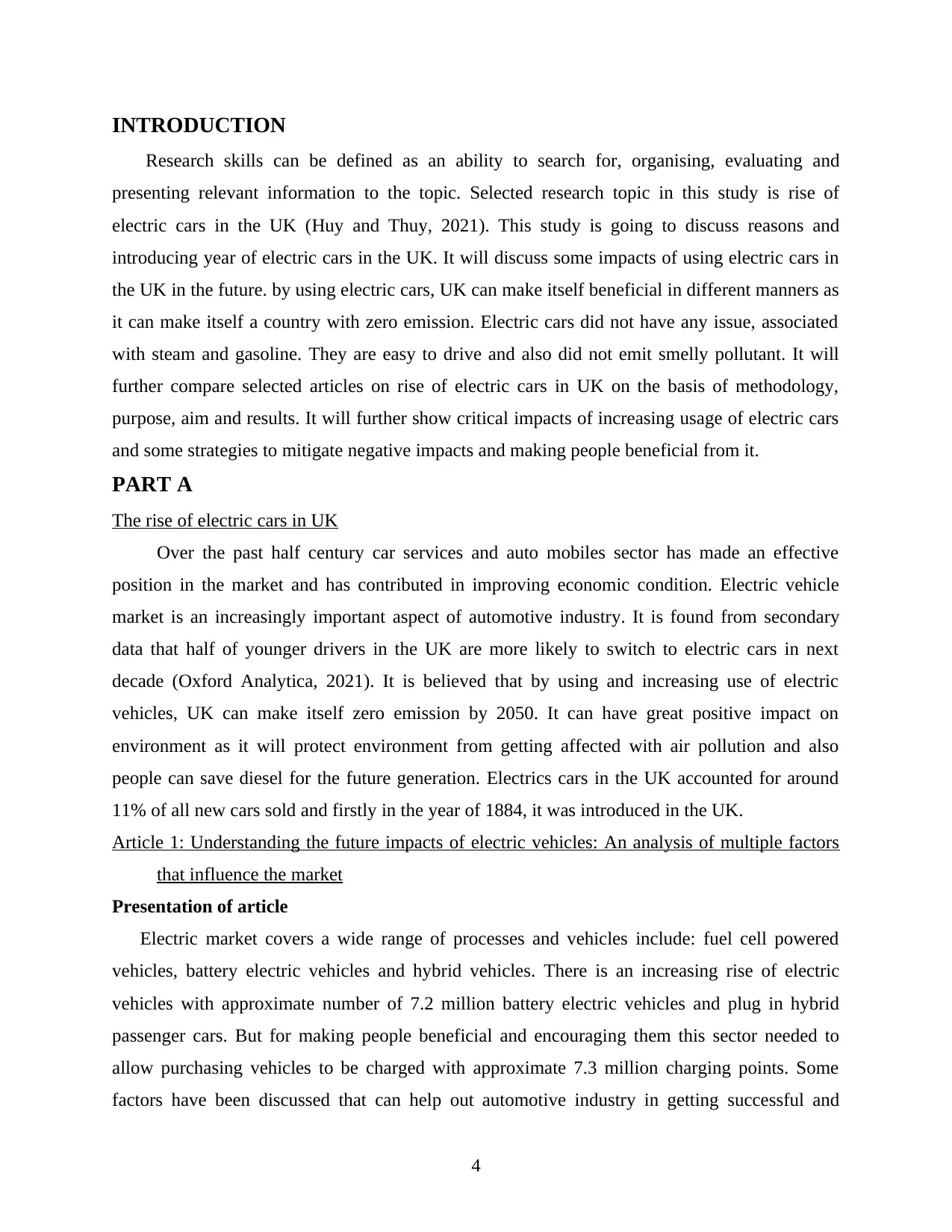
INTRODUCTION
Research skills can be defined as an ability to search for, organising, evaluating and
presenting relevant information to the topic. Selected research topic in this study is rise of
electric cars in the UK (Huy and Thuy, 2021). This study is going to discuss reasons and
introducing year of electric cars in the UK. It will discuss some impacts of using electric cars in
the UK in the future. by using electric cars, UK can make itself beneficial in different manners as
it can make itself a country with zero emission. Electric cars did not have any issue, associated
with steam and gasoline. They are easy to drive and also did not emit smelly pollutant. It will
further compare selected articles on rise of electric cars in UK on the basis of methodology,
purpose, aim and results. It will further show critical impacts of increasing usage of electric cars
and some strategies to mitigate negative impacts and making people beneficial from it.
PART A
The rise of electric cars in UK
Over the past half century car services and auto mobiles sector has made an effective
position in the market and has contributed in improving economic condition. Electric vehicle
market is an increasingly important aspect of automotive industry. It is found from secondary
data that half of younger drivers in the UK are more likely to switch to electric cars in next
decade (Oxford Analytica, 2021). It is believed that by using and increasing use of electric
vehicles, UK can make itself zero emission by 2050. It can have great positive impact on
environment as it will protect environment from getting affected with air pollution and also
people can save diesel for the future generation. Electrics cars in the UK accounted for around
11% of all new cars sold and firstly in the year of 1884, it was introduced in the UK.
Article 1: Understanding the future impacts of electric vehicles: An analysis of multiple factors
that influence the market
Presentation of article
Electric market covers a wide range of processes and vehicles include: fuel cell powered
vehicles, battery electric vehicles and hybrid vehicles. There is an increasing rise of electric
vehicles with approximate number of 7.2 million battery electric vehicles and plug in hybrid
passenger cars. But for making people beneficial and encouraging them this sector needed to
allow purchasing vehicles to be charged with approximate 7.3 million charging points. Some
factors have been discussed that can help out automotive industry in getting successful and
4
Research skills can be defined as an ability to search for, organising, evaluating and
presenting relevant information to the topic. Selected research topic in this study is rise of
electric cars in the UK (Huy and Thuy, 2021). This study is going to discuss reasons and
introducing year of electric cars in the UK. It will discuss some impacts of using electric cars in
the UK in the future. by using electric cars, UK can make itself beneficial in different manners as
it can make itself a country with zero emission. Electric cars did not have any issue, associated
with steam and gasoline. They are easy to drive and also did not emit smelly pollutant. It will
further compare selected articles on rise of electric cars in UK on the basis of methodology,
purpose, aim and results. It will further show critical impacts of increasing usage of electric cars
and some strategies to mitigate negative impacts and making people beneficial from it.
PART A
The rise of electric cars in UK
Over the past half century car services and auto mobiles sector has made an effective
position in the market and has contributed in improving economic condition. Electric vehicle
market is an increasingly important aspect of automotive industry. It is found from secondary
data that half of younger drivers in the UK are more likely to switch to electric cars in next
decade (Oxford Analytica, 2021). It is believed that by using and increasing use of electric
vehicles, UK can make itself zero emission by 2050. It can have great positive impact on
environment as it will protect environment from getting affected with air pollution and also
people can save diesel for the future generation. Electrics cars in the UK accounted for around
11% of all new cars sold and firstly in the year of 1884, it was introduced in the UK.
Article 1: Understanding the future impacts of electric vehicles: An analysis of multiple factors
that influence the market
Presentation of article
Electric market covers a wide range of processes and vehicles include: fuel cell powered
vehicles, battery electric vehicles and hybrid vehicles. There is an increasing rise of electric
vehicles with approximate number of 7.2 million battery electric vehicles and plug in hybrid
passenger cars. But for making people beneficial and encouraging them this sector needed to
allow purchasing vehicles to be charged with approximate 7.3 million charging points. Some
factors have been discussed that can help out automotive industry in getting successful and
4
Paraphrase This Document
Need a fresh take? Get an instant paraphrase of this document with our AI Paraphraser
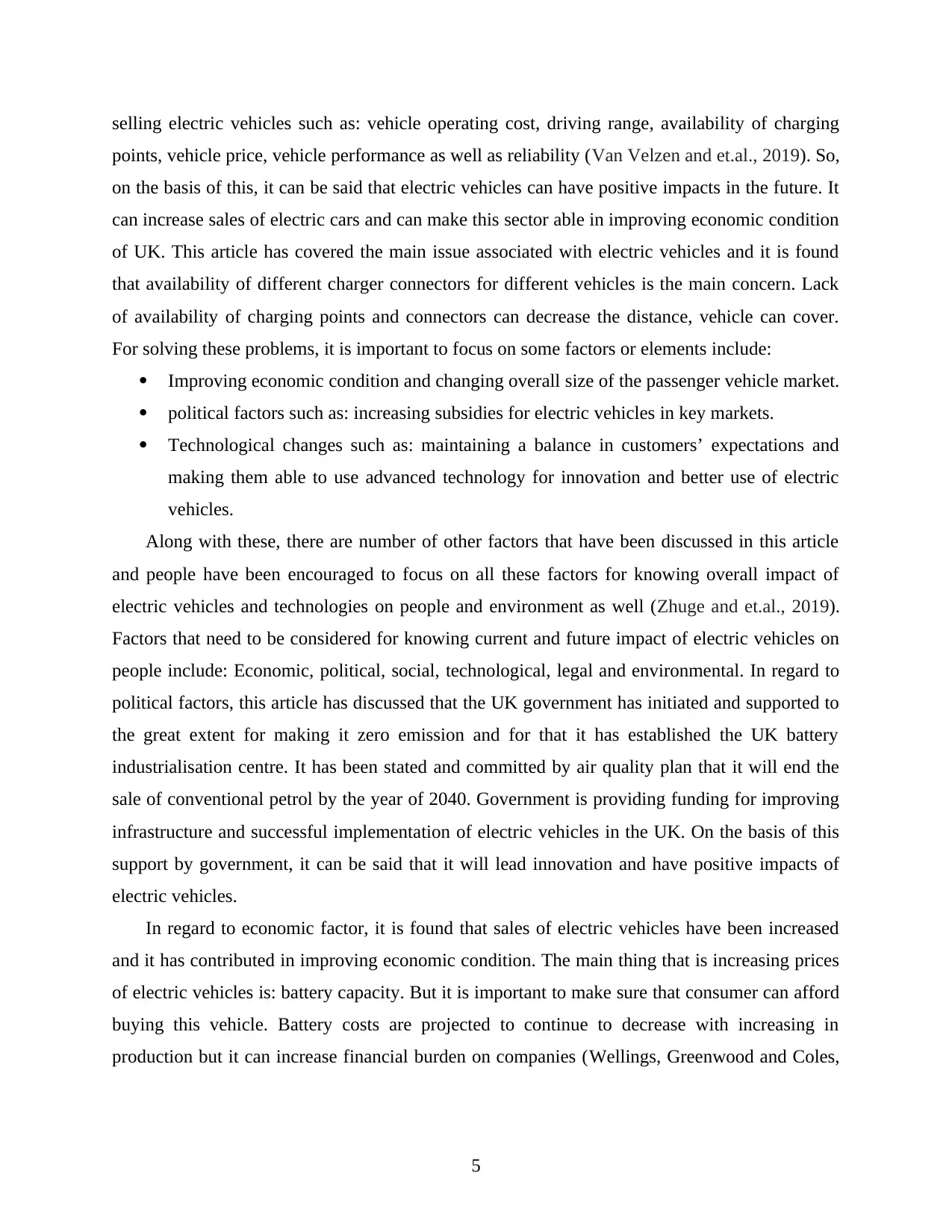
selling electric vehicles such as: vehicle operating cost, driving range, availability of charging
points, vehicle price, vehicle performance as well as reliability (Van Velzen and et.al., 2019). So,
on the basis of this, it can be said that electric vehicles can have positive impacts in the future. It
can increase sales of electric cars and can make this sector able in improving economic condition
of UK. This article has covered the main issue associated with electric vehicles and it is found
that availability of different charger connectors for different vehicles is the main concern. Lack
of availability of charging points and connectors can decrease the distance, vehicle can cover.
For solving these problems, it is important to focus on some factors or elements include:
Improving economic condition and changing overall size of the passenger vehicle market.
political factors such as: increasing subsidies for electric vehicles in key markets.
Technological changes such as: maintaining a balance in customers’ expectations and
making them able to use advanced technology for innovation and better use of electric
vehicles.
Along with these, there are number of other factors that have been discussed in this article
and people have been encouraged to focus on all these factors for knowing overall impact of
electric vehicles and technologies on people and environment as well (Zhuge and et.al., 2019).
Factors that need to be considered for knowing current and future impact of electric vehicles on
people include: Economic, political, social, technological, legal and environmental. In regard to
political factors, this article has discussed that the UK government has initiated and supported to
the great extent for making it zero emission and for that it has established the UK battery
industrialisation centre. It has been stated and committed by air quality plan that it will end the
sale of conventional petrol by the year of 2040. Government is providing funding for improving
infrastructure and successful implementation of electric vehicles in the UK. On the basis of this
support by government, it can be said that it will lead innovation and have positive impacts of
electric vehicles.
In regard to economic factor, it is found that sales of electric vehicles have been increased
and it has contributed in improving economic condition. The main thing that is increasing prices
of electric vehicles is: battery capacity. But it is important to make sure that consumer can afford
buying this vehicle. Battery costs are projected to continue to decrease with increasing in
production but it can increase financial burden on companies (Wellings, Greenwood and Coles,
5
points, vehicle price, vehicle performance as well as reliability (Van Velzen and et.al., 2019). So,
on the basis of this, it can be said that electric vehicles can have positive impacts in the future. It
can increase sales of electric cars and can make this sector able in improving economic condition
of UK. This article has covered the main issue associated with electric vehicles and it is found
that availability of different charger connectors for different vehicles is the main concern. Lack
of availability of charging points and connectors can decrease the distance, vehicle can cover.
For solving these problems, it is important to focus on some factors or elements include:
Improving economic condition and changing overall size of the passenger vehicle market.
political factors such as: increasing subsidies for electric vehicles in key markets.
Technological changes such as: maintaining a balance in customers’ expectations and
making them able to use advanced technology for innovation and better use of electric
vehicles.
Along with these, there are number of other factors that have been discussed in this article
and people have been encouraged to focus on all these factors for knowing overall impact of
electric vehicles and technologies on people and environment as well (Zhuge and et.al., 2019).
Factors that need to be considered for knowing current and future impact of electric vehicles on
people include: Economic, political, social, technological, legal and environmental. In regard to
political factors, this article has discussed that the UK government has initiated and supported to
the great extent for making it zero emission and for that it has established the UK battery
industrialisation centre. It has been stated and committed by air quality plan that it will end the
sale of conventional petrol by the year of 2040. Government is providing funding for improving
infrastructure and successful implementation of electric vehicles in the UK. On the basis of this
support by government, it can be said that it will lead innovation and have positive impacts of
electric vehicles.
In regard to economic factor, it is found that sales of electric vehicles have been increased
and it has contributed in improving economic condition. The main thing that is increasing prices
of electric vehicles is: battery capacity. But it is important to make sure that consumer can afford
buying this vehicle. Battery costs are projected to continue to decrease with increasing in
production but it can increase financial burden on companies (Wellings, Greenwood and Coles,
5
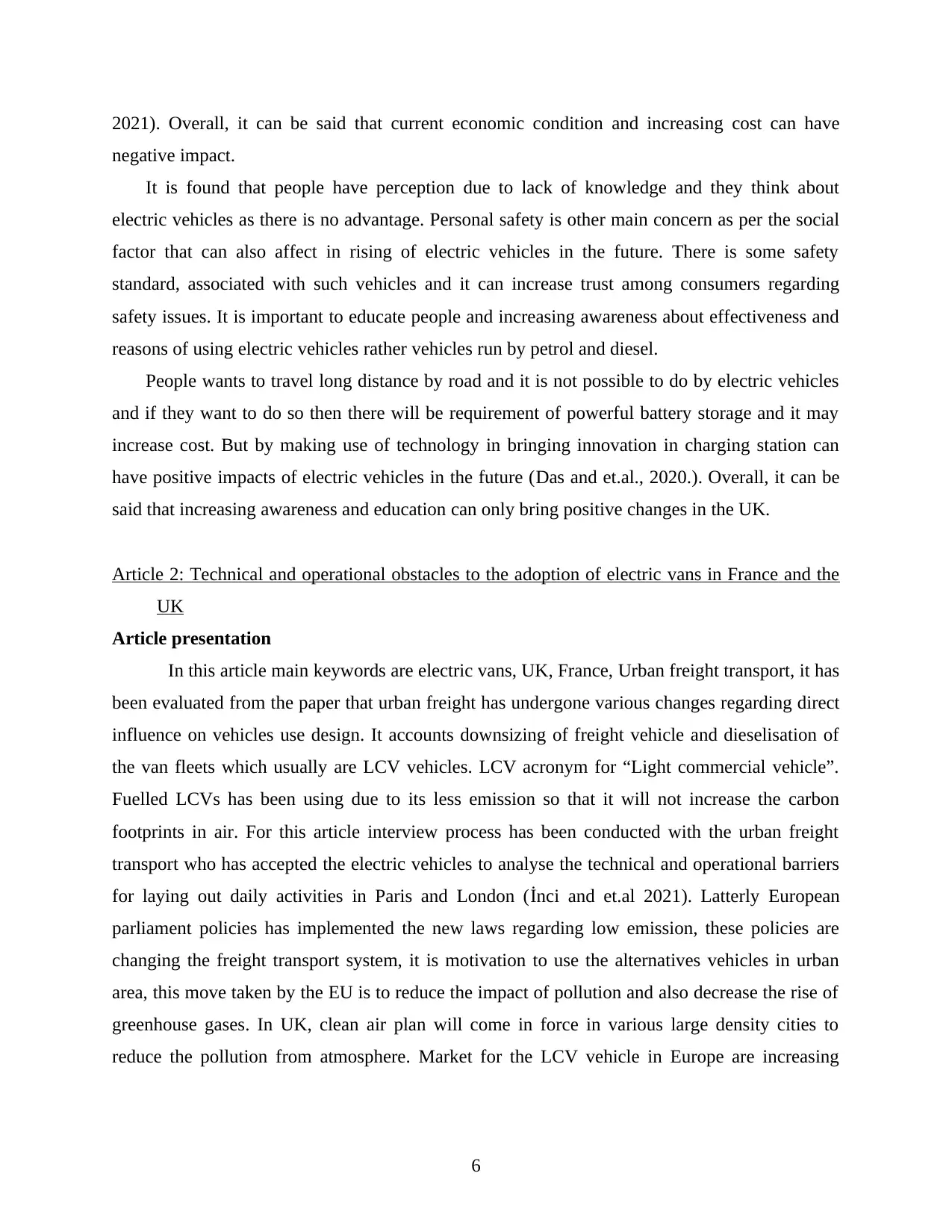
2021). Overall, it can be said that current economic condition and increasing cost can have
negative impact.
It is found that people have perception due to lack of knowledge and they think about
electric vehicles as there is no advantage. Personal safety is other main concern as per the social
factor that can also affect in rising of electric vehicles in the future. There is some safety
standard, associated with such vehicles and it can increase trust among consumers regarding
safety issues. It is important to educate people and increasing awareness about effectiveness and
reasons of using electric vehicles rather vehicles run by petrol and diesel.
People wants to travel long distance by road and it is not possible to do by electric vehicles
and if they want to do so then there will be requirement of powerful battery storage and it may
increase cost. But by making use of technology in bringing innovation in charging station can
have positive impacts of electric vehicles in the future (Das and et.al., 2020.). Overall, it can be
said that increasing awareness and education can only bring positive changes in the UK.
Article 2: Technical and operational obstacles to the adoption of electric vans in France and the
UK
Article presentation
In this article main keywords are electric vans, UK, France, Urban freight transport, it has
been evaluated from the paper that urban freight has undergone various changes regarding direct
influence on vehicles use design. It accounts downsizing of freight vehicle and dieselisation of
the van fleets which usually are LCV vehicles. LCV acronym for “Light commercial vehicle”.
Fuelled LCVs has been using due to its less emission so that it will not increase the carbon
footprints in air. For this article interview process has been conducted with the urban freight
transport who has accepted the electric vehicles to analyse the technical and operational barriers
for laying out daily activities in Paris and London (İnci and et.al 2021). Latterly European
parliament policies has implemented the new laws regarding low emission, these policies are
changing the freight transport system, it is motivation to use the alternatives vehicles in urban
area, this move taken by the EU is to reduce the impact of pollution and also decrease the rise of
greenhouse gases. In UK, clean air plan will come in force in various large density cities to
reduce the pollution from atmosphere. Market for the LCV vehicle in Europe are increasing
6
negative impact.
It is found that people have perception due to lack of knowledge and they think about
electric vehicles as there is no advantage. Personal safety is other main concern as per the social
factor that can also affect in rising of electric vehicles in the future. There is some safety
standard, associated with such vehicles and it can increase trust among consumers regarding
safety issues. It is important to educate people and increasing awareness about effectiveness and
reasons of using electric vehicles rather vehicles run by petrol and diesel.
People wants to travel long distance by road and it is not possible to do by electric vehicles
and if they want to do so then there will be requirement of powerful battery storage and it may
increase cost. But by making use of technology in bringing innovation in charging station can
have positive impacts of electric vehicles in the future (Das and et.al., 2020.). Overall, it can be
said that increasing awareness and education can only bring positive changes in the UK.
Article 2: Technical and operational obstacles to the adoption of electric vans in France and the
UK
Article presentation
In this article main keywords are electric vans, UK, France, Urban freight transport, it has
been evaluated from the paper that urban freight has undergone various changes regarding direct
influence on vehicles use design. It accounts downsizing of freight vehicle and dieselisation of
the van fleets which usually are LCV vehicles. LCV acronym for “Light commercial vehicle”.
Fuelled LCVs has been using due to its less emission so that it will not increase the carbon
footprints in air. For this article interview process has been conducted with the urban freight
transport who has accepted the electric vehicles to analyse the technical and operational barriers
for laying out daily activities in Paris and London (İnci and et.al 2021). Latterly European
parliament policies has implemented the new laws regarding low emission, these policies are
changing the freight transport system, it is motivation to use the alternatives vehicles in urban
area, this move taken by the EU is to reduce the impact of pollution and also decrease the rise of
greenhouse gases. In UK, clean air plan will come in force in various large density cities to
reduce the pollution from atmosphere. Market for the LCV vehicle in Europe are increasing
6
⊘ This is a preview!⊘
Do you want full access?
Subscribe today to unlock all pages.

Trusted by 1+ million students worldwide
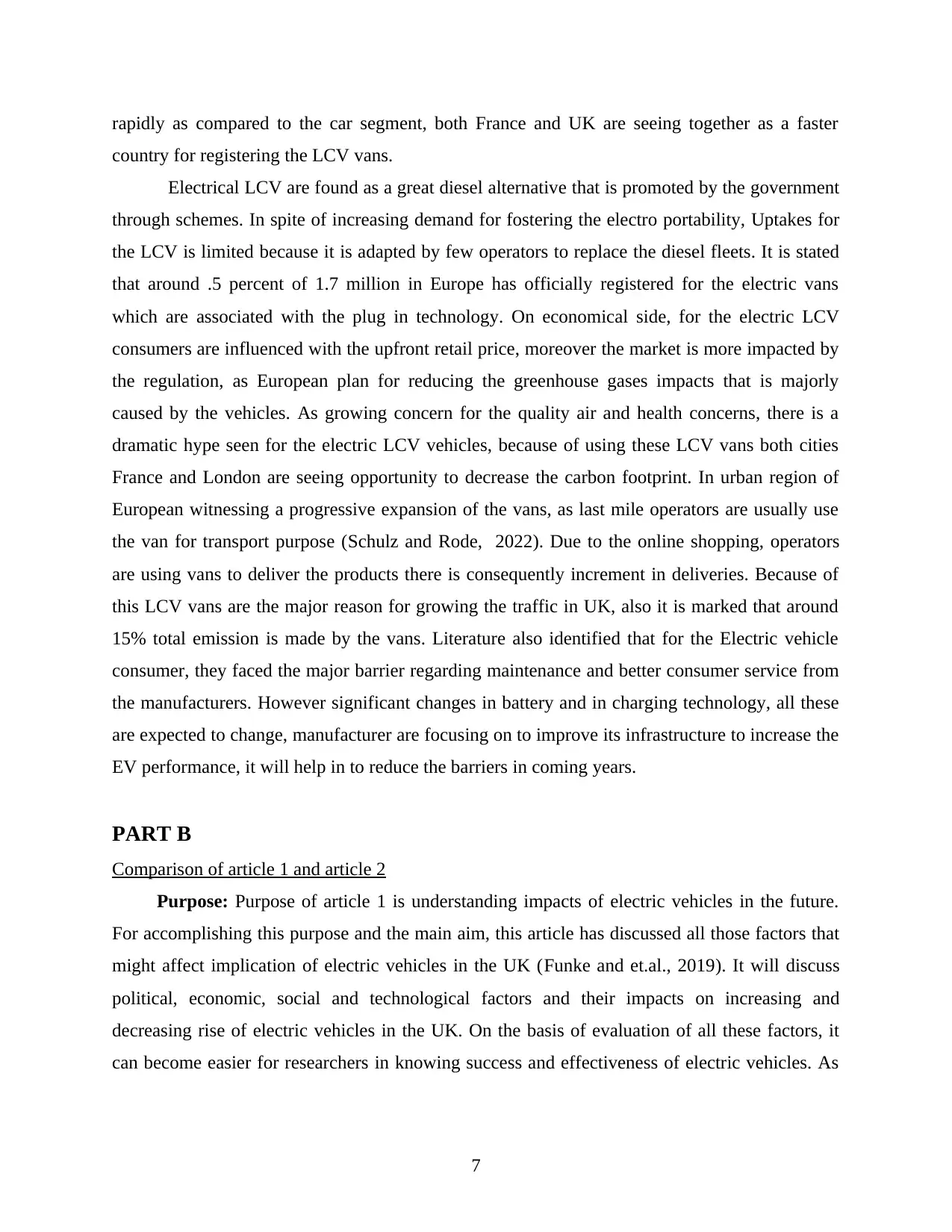
rapidly as compared to the car segment, both France and UK are seeing together as a faster
country for registering the LCV vans.
Electrical LCV are found as a great diesel alternative that is promoted by the government
through schemes. In spite of increasing demand for fostering the electro portability, Uptakes for
the LCV is limited because it is adapted by few operators to replace the diesel fleets. It is stated
that around .5 percent of 1.7 million in Europe has officially registered for the electric vans
which are associated with the plug in technology. On economical side, for the electric LCV
consumers are influenced with the upfront retail price, moreover the market is more impacted by
the regulation, as European plan for reducing the greenhouse gases impacts that is majorly
caused by the vehicles. As growing concern for the quality air and health concerns, there is a
dramatic hype seen for the electric LCV vehicles, because of using these LCV vans both cities
France and London are seeing opportunity to decrease the carbon footprint. In urban region of
European witnessing a progressive expansion of the vans, as last mile operators are usually use
the van for transport purpose (Schulz and Rode, 2022). Due to the online shopping, operators
are using vans to deliver the products there is consequently increment in deliveries. Because of
this LCV vans are the major reason for growing the traffic in UK, also it is marked that around
15% total emission is made by the vans. Literature also identified that for the Electric vehicle
consumer, they faced the major barrier regarding maintenance and better consumer service from
the manufacturers. However significant changes in battery and in charging technology, all these
are expected to change, manufacturer are focusing on to improve its infrastructure to increase the
EV performance, it will help in to reduce the barriers in coming years.
PART B
Comparison of article 1 and article 2
Purpose: Purpose of article 1 is understanding impacts of electric vehicles in the future.
For accomplishing this purpose and the main aim, this article has discussed all those factors that
might affect implication of electric vehicles in the UK (Funke and et.al., 2019). It will discuss
political, economic, social and technological factors and their impacts on increasing and
decreasing rise of electric vehicles in the UK. On the basis of evaluation of all these factors, it
can become easier for researchers in knowing success and effectiveness of electric vehicles. As
7
country for registering the LCV vans.
Electrical LCV are found as a great diesel alternative that is promoted by the government
through schemes. In spite of increasing demand for fostering the electro portability, Uptakes for
the LCV is limited because it is adapted by few operators to replace the diesel fleets. It is stated
that around .5 percent of 1.7 million in Europe has officially registered for the electric vans
which are associated with the plug in technology. On economical side, for the electric LCV
consumers are influenced with the upfront retail price, moreover the market is more impacted by
the regulation, as European plan for reducing the greenhouse gases impacts that is majorly
caused by the vehicles. As growing concern for the quality air and health concerns, there is a
dramatic hype seen for the electric LCV vehicles, because of using these LCV vans both cities
France and London are seeing opportunity to decrease the carbon footprint. In urban region of
European witnessing a progressive expansion of the vans, as last mile operators are usually use
the van for transport purpose (Schulz and Rode, 2022). Due to the online shopping, operators
are using vans to deliver the products there is consequently increment in deliveries. Because of
this LCV vans are the major reason for growing the traffic in UK, also it is marked that around
15% total emission is made by the vans. Literature also identified that for the Electric vehicle
consumer, they faced the major barrier regarding maintenance and better consumer service from
the manufacturers. However significant changes in battery and in charging technology, all these
are expected to change, manufacturer are focusing on to improve its infrastructure to increase the
EV performance, it will help in to reduce the barriers in coming years.
PART B
Comparison of article 1 and article 2
Purpose: Purpose of article 1 is understanding impacts of electric vehicles in the future.
For accomplishing this purpose and the main aim, this article has discussed all those factors that
might affect implication of electric vehicles in the UK (Funke and et.al., 2019). It will discuss
political, economic, social and technological factors and their impacts on increasing and
decreasing rise of electric vehicles in the UK. On the basis of evaluation of all these factors, it
can become easier for researchers in knowing success and effectiveness of electric vehicles. As
7
Paraphrase This Document
Need a fresh take? Get an instant paraphrase of this document with our AI Paraphraser
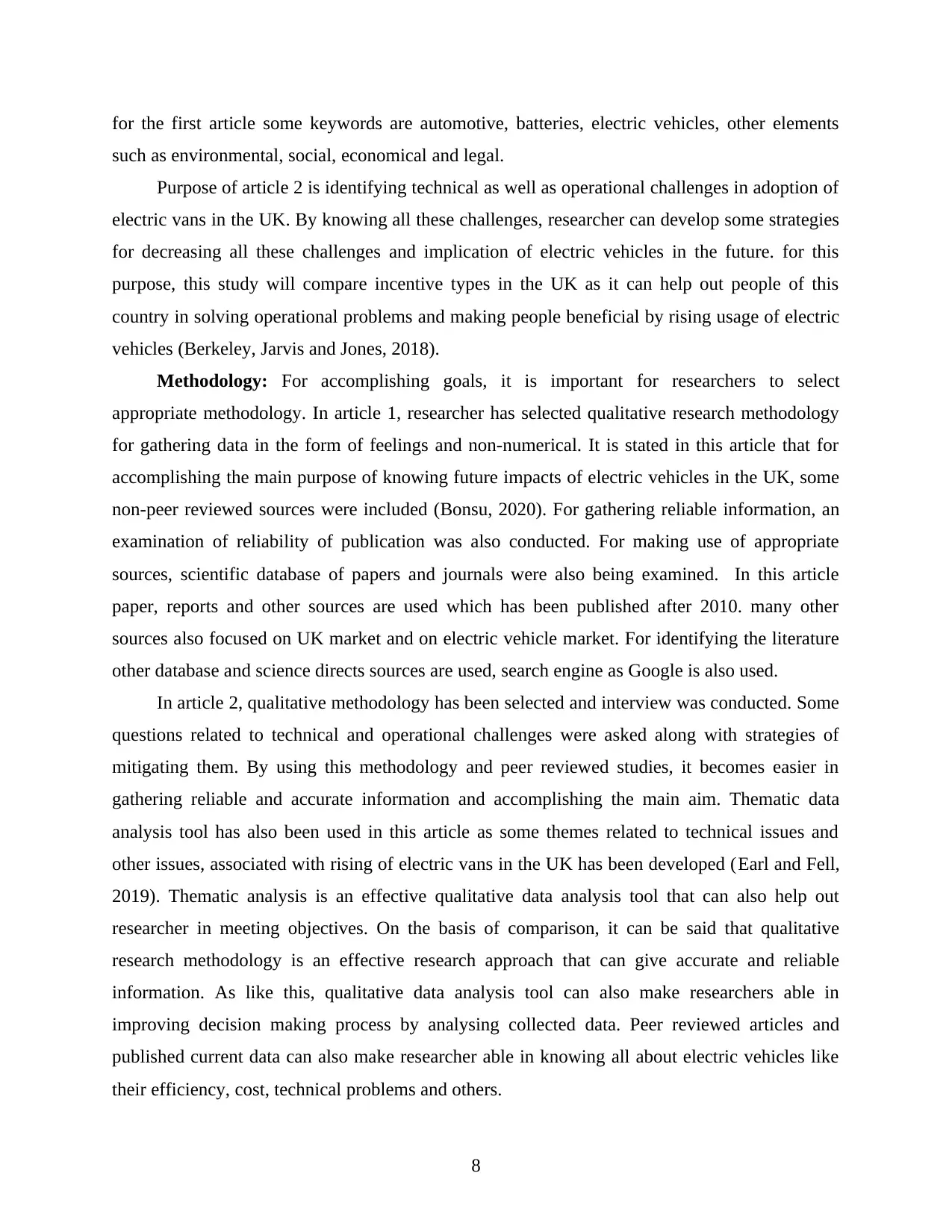
for the first article some keywords are automotive, batteries, electric vehicles, other elements
such as environmental, social, economical and legal.
Purpose of article 2 is identifying technical as well as operational challenges in adoption of
electric vans in the UK. By knowing all these challenges, researcher can develop some strategies
for decreasing all these challenges and implication of electric vehicles in the future. for this
purpose, this study will compare incentive types in the UK as it can help out people of this
country in solving operational problems and making people beneficial by rising usage of electric
vehicles (Berkeley, Jarvis and Jones, 2018).
Methodology: For accomplishing goals, it is important for researchers to select
appropriate methodology. In article 1, researcher has selected qualitative research methodology
for gathering data in the form of feelings and non-numerical. It is stated in this article that for
accomplishing the main purpose of knowing future impacts of electric vehicles in the UK, some
non-peer reviewed sources were included (Bonsu, 2020). For gathering reliable information, an
examination of reliability of publication was also conducted. For making use of appropriate
sources, scientific database of papers and journals were also being examined. In this article
paper, reports and other sources are used which has been published after 2010. many other
sources also focused on UK market and on electric vehicle market. For identifying the literature
other database and science directs sources are used, search engine as Google is also used.
In article 2, qualitative methodology has been selected and interview was conducted. Some
questions related to technical and operational challenges were asked along with strategies of
mitigating them. By using this methodology and peer reviewed studies, it becomes easier in
gathering reliable and accurate information and accomplishing the main aim. Thematic data
analysis tool has also been used in this article as some themes related to technical issues and
other issues, associated with rising of electric vans in the UK has been developed (Earl and Fell,
2019). Thematic analysis is an effective qualitative data analysis tool that can also help out
researcher in meeting objectives. On the basis of comparison, it can be said that qualitative
research methodology is an effective research approach that can give accurate and reliable
information. As like this, qualitative data analysis tool can also make researchers able in
improving decision making process by analysing collected data. Peer reviewed articles and
published current data can also make researcher able in knowing all about electric vehicles like
their efficiency, cost, technical problems and others.
8
such as environmental, social, economical and legal.
Purpose of article 2 is identifying technical as well as operational challenges in adoption of
electric vans in the UK. By knowing all these challenges, researcher can develop some strategies
for decreasing all these challenges and implication of electric vehicles in the future. for this
purpose, this study will compare incentive types in the UK as it can help out people of this
country in solving operational problems and making people beneficial by rising usage of electric
vehicles (Berkeley, Jarvis and Jones, 2018).
Methodology: For accomplishing goals, it is important for researchers to select
appropriate methodology. In article 1, researcher has selected qualitative research methodology
for gathering data in the form of feelings and non-numerical. It is stated in this article that for
accomplishing the main purpose of knowing future impacts of electric vehicles in the UK, some
non-peer reviewed sources were included (Bonsu, 2020). For gathering reliable information, an
examination of reliability of publication was also conducted. For making use of appropriate
sources, scientific database of papers and journals were also being examined. In this article
paper, reports and other sources are used which has been published after 2010. many other
sources also focused on UK market and on electric vehicle market. For identifying the literature
other database and science directs sources are used, search engine as Google is also used.
In article 2, qualitative methodology has been selected and interview was conducted. Some
questions related to technical and operational challenges were asked along with strategies of
mitigating them. By using this methodology and peer reviewed studies, it becomes easier in
gathering reliable and accurate information and accomplishing the main aim. Thematic data
analysis tool has also been used in this article as some themes related to technical issues and
other issues, associated with rising of electric vans in the UK has been developed (Earl and Fell,
2019). Thematic analysis is an effective qualitative data analysis tool that can also help out
researcher in meeting objectives. On the basis of comparison, it can be said that qualitative
research methodology is an effective research approach that can give accurate and reliable
information. As like this, qualitative data analysis tool can also make researchers able in
improving decision making process by analysing collected data. Peer reviewed articles and
published current data can also make researcher able in knowing all about electric vehicles like
their efficiency, cost, technical problems and others.
8
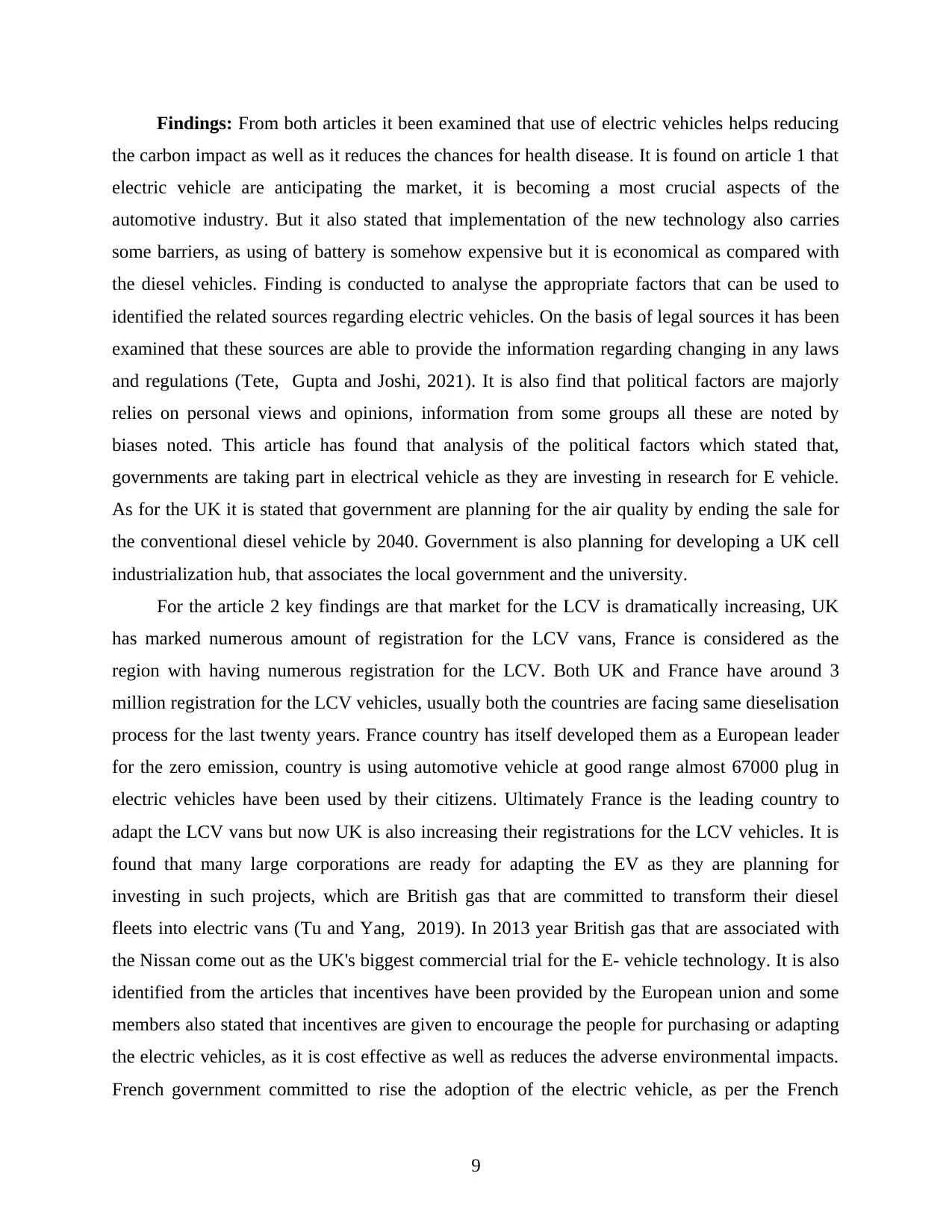
Findings: From both articles it been examined that use of electric vehicles helps reducing
the carbon impact as well as it reduces the chances for health disease. It is found on article 1 that
electric vehicle are anticipating the market, it is becoming a most crucial aspects of the
automotive industry. But it also stated that implementation of the new technology also carries
some barriers, as using of battery is somehow expensive but it is economical as compared with
the diesel vehicles. Finding is conducted to analyse the appropriate factors that can be used to
identified the related sources regarding electric vehicles. On the basis of legal sources it has been
examined that these sources are able to provide the information regarding changing in any laws
and regulations (Tete, Gupta and Joshi, 2021). It is also find that political factors are majorly
relies on personal views and opinions, information from some groups all these are noted by
biases noted. This article has found that analysis of the political factors which stated that,
governments are taking part in electrical vehicle as they are investing in research for E vehicle.
As for the UK it is stated that government are planning for the air quality by ending the sale for
the conventional diesel vehicle by 2040. Government is also planning for developing a UK cell
industrialization hub, that associates the local government and the university.
For the article 2 key findings are that market for the LCV is dramatically increasing, UK
has marked numerous amount of registration for the LCV vans, France is considered as the
region with having numerous registration for the LCV. Both UK and France have around 3
million registration for the LCV vehicles, usually both the countries are facing same dieselisation
process for the last twenty years. France country has itself developed them as a European leader
for the zero emission, country is using automotive vehicle at good range almost 67000 plug in
electric vehicles have been used by their citizens. Ultimately France is the leading country to
adapt the LCV vans but now UK is also increasing their registrations for the LCV vehicles. It is
found that many large corporations are ready for adapting the EV as they are planning for
investing in such projects, which are British gas that are committed to transform their diesel
fleets into electric vans (Tu and Yang, 2019). In 2013 year British gas that are associated with
the Nissan come out as the UK's biggest commercial trial for the E- vehicle technology. It is also
identified from the articles that incentives have been provided by the European union and some
members also stated that incentives are given to encourage the people for purchasing or adapting
the electric vehicles, as it is cost effective as well as reduces the adverse environmental impacts.
French government committed to rise the adoption of the electric vehicle, as per the French
9
the carbon impact as well as it reduces the chances for health disease. It is found on article 1 that
electric vehicle are anticipating the market, it is becoming a most crucial aspects of the
automotive industry. But it also stated that implementation of the new technology also carries
some barriers, as using of battery is somehow expensive but it is economical as compared with
the diesel vehicles. Finding is conducted to analyse the appropriate factors that can be used to
identified the related sources regarding electric vehicles. On the basis of legal sources it has been
examined that these sources are able to provide the information regarding changing in any laws
and regulations (Tete, Gupta and Joshi, 2021). It is also find that political factors are majorly
relies on personal views and opinions, information from some groups all these are noted by
biases noted. This article has found that analysis of the political factors which stated that,
governments are taking part in electrical vehicle as they are investing in research for E vehicle.
As for the UK it is stated that government are planning for the air quality by ending the sale for
the conventional diesel vehicle by 2040. Government is also planning for developing a UK cell
industrialization hub, that associates the local government and the university.
For the article 2 key findings are that market for the LCV is dramatically increasing, UK
has marked numerous amount of registration for the LCV vans, France is considered as the
region with having numerous registration for the LCV. Both UK and France have around 3
million registration for the LCV vehicles, usually both the countries are facing same dieselisation
process for the last twenty years. France country has itself developed them as a European leader
for the zero emission, country is using automotive vehicle at good range almost 67000 plug in
electric vehicles have been used by their citizens. Ultimately France is the leading country to
adapt the LCV vans but now UK is also increasing their registrations for the LCV vehicles. It is
found that many large corporations are ready for adapting the EV as they are planning for
investing in such projects, which are British gas that are committed to transform their diesel
fleets into electric vans (Tu and Yang, 2019). In 2013 year British gas that are associated with
the Nissan come out as the UK's biggest commercial trial for the E- vehicle technology. It is also
identified from the articles that incentives have been provided by the European union and some
members also stated that incentives are given to encourage the people for purchasing or adapting
the electric vehicles, as it is cost effective as well as reduces the adverse environmental impacts.
French government committed to rise the adoption of the electric vehicle, as per the French
9
⊘ This is a preview!⊘
Do you want full access?
Subscribe today to unlock all pages.

Trusted by 1+ million students worldwide
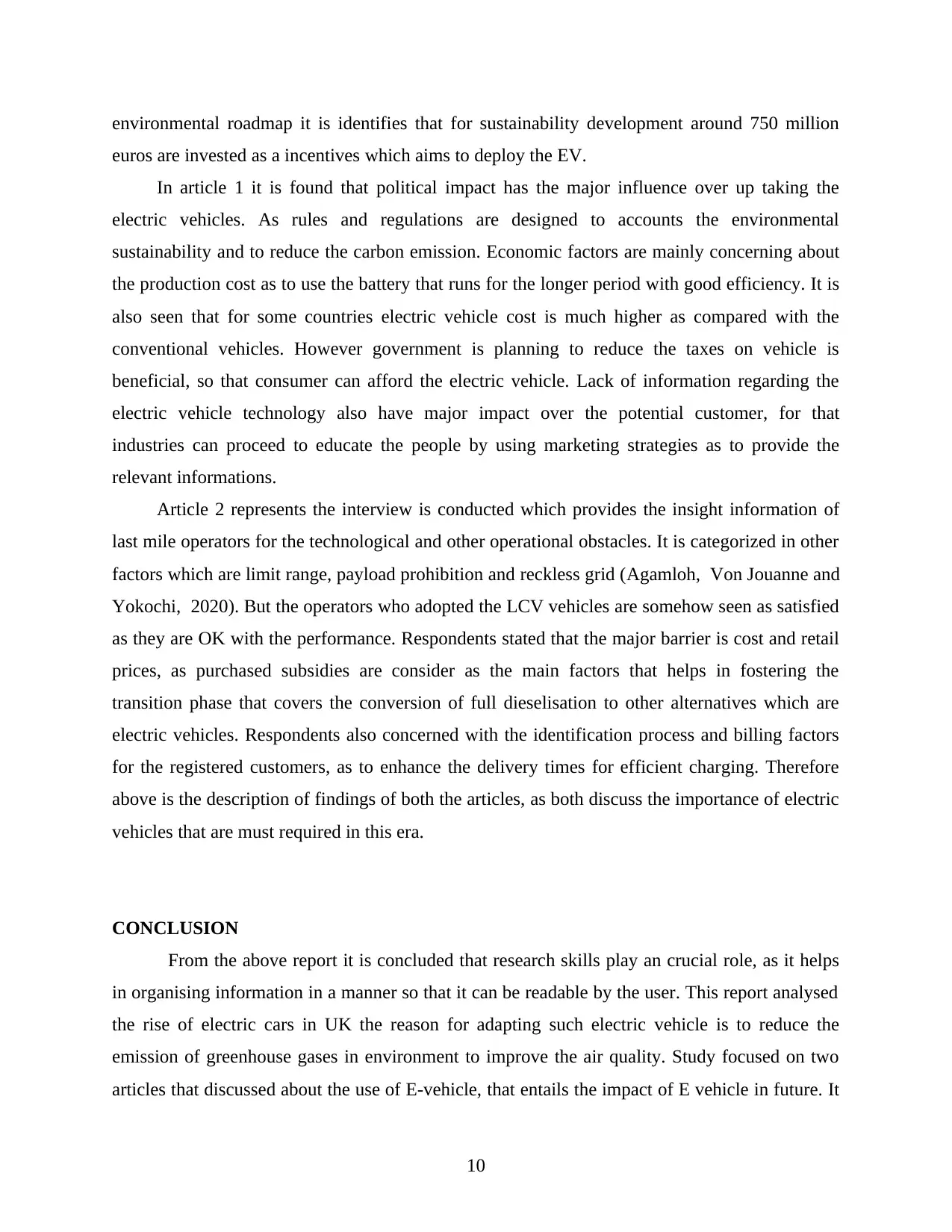
environmental roadmap it is identifies that for sustainability development around 750 million
euros are invested as a incentives which aims to deploy the EV.
In article 1 it is found that political impact has the major influence over up taking the
electric vehicles. As rules and regulations are designed to accounts the environmental
sustainability and to reduce the carbon emission. Economic factors are mainly concerning about
the production cost as to use the battery that runs for the longer period with good efficiency. It is
also seen that for some countries electric vehicle cost is much higher as compared with the
conventional vehicles. However government is planning to reduce the taxes on vehicle is
beneficial, so that consumer can afford the electric vehicle. Lack of information regarding the
electric vehicle technology also have major impact over the potential customer, for that
industries can proceed to educate the people by using marketing strategies as to provide the
relevant informations.
Article 2 represents the interview is conducted which provides the insight information of
last mile operators for the technological and other operational obstacles. It is categorized in other
factors which are limit range, payload prohibition and reckless grid (Agamloh, Von Jouanne and
Yokochi, 2020). But the operators who adopted the LCV vehicles are somehow seen as satisfied
as they are OK with the performance. Respondents stated that the major barrier is cost and retail
prices, as purchased subsidies are consider as the main factors that helps in fostering the
transition phase that covers the conversion of full dieselisation to other alternatives which are
electric vehicles. Respondents also concerned with the identification process and billing factors
for the registered customers, as to enhance the delivery times for efficient charging. Therefore
above is the description of findings of both the articles, as both discuss the importance of electric
vehicles that are must required in this era.
CONCLUSION
From the above report it is concluded that research skills play an crucial role, as it helps
in organising information in a manner so that it can be readable by the user. This report analysed
the rise of electric cars in UK the reason for adapting such electric vehicle is to reduce the
emission of greenhouse gases in environment to improve the air quality. Study focused on two
articles that discussed about the use of E-vehicle, that entails the impact of E vehicle in future. It
10
euros are invested as a incentives which aims to deploy the EV.
In article 1 it is found that political impact has the major influence over up taking the
electric vehicles. As rules and regulations are designed to accounts the environmental
sustainability and to reduce the carbon emission. Economic factors are mainly concerning about
the production cost as to use the battery that runs for the longer period with good efficiency. It is
also seen that for some countries electric vehicle cost is much higher as compared with the
conventional vehicles. However government is planning to reduce the taxes on vehicle is
beneficial, so that consumer can afford the electric vehicle. Lack of information regarding the
electric vehicle technology also have major impact over the potential customer, for that
industries can proceed to educate the people by using marketing strategies as to provide the
relevant informations.
Article 2 represents the interview is conducted which provides the insight information of
last mile operators for the technological and other operational obstacles. It is categorized in other
factors which are limit range, payload prohibition and reckless grid (Agamloh, Von Jouanne and
Yokochi, 2020). But the operators who adopted the LCV vehicles are somehow seen as satisfied
as they are OK with the performance. Respondents stated that the major barrier is cost and retail
prices, as purchased subsidies are consider as the main factors that helps in fostering the
transition phase that covers the conversion of full dieselisation to other alternatives which are
electric vehicles. Respondents also concerned with the identification process and billing factors
for the registered customers, as to enhance the delivery times for efficient charging. Therefore
above is the description of findings of both the articles, as both discuss the importance of electric
vehicles that are must required in this era.
CONCLUSION
From the above report it is concluded that research skills play an crucial role, as it helps
in organising information in a manner so that it can be readable by the user. This report analysed
the rise of electric cars in UK the reason for adapting such electric vehicle is to reduce the
emission of greenhouse gases in environment to improve the air quality. Study focused on two
articles that discussed about the use of E-vehicle, that entails the impact of E vehicle in future. It
10
Paraphrase This Document
Need a fresh take? Get an instant paraphrase of this document with our AI Paraphraser

lay out the two parts in which it covers the description about both articles along with their
currency and reliability. it discussed the background of the topic which covers the information
regarding E vehicle how this terminology is brought into practices. this report further illustrated
the Summary of the key findings of both articles it also lays out the comparison between both
papers which includes purpose, methodology and results.
11
currency and reliability. it discussed the background of the topic which covers the information
regarding E vehicle how this terminology is brought into practices. this report further illustrated
the Summary of the key findings of both articles it also lays out the comparison between both
papers which includes purpose, methodology and results.
11
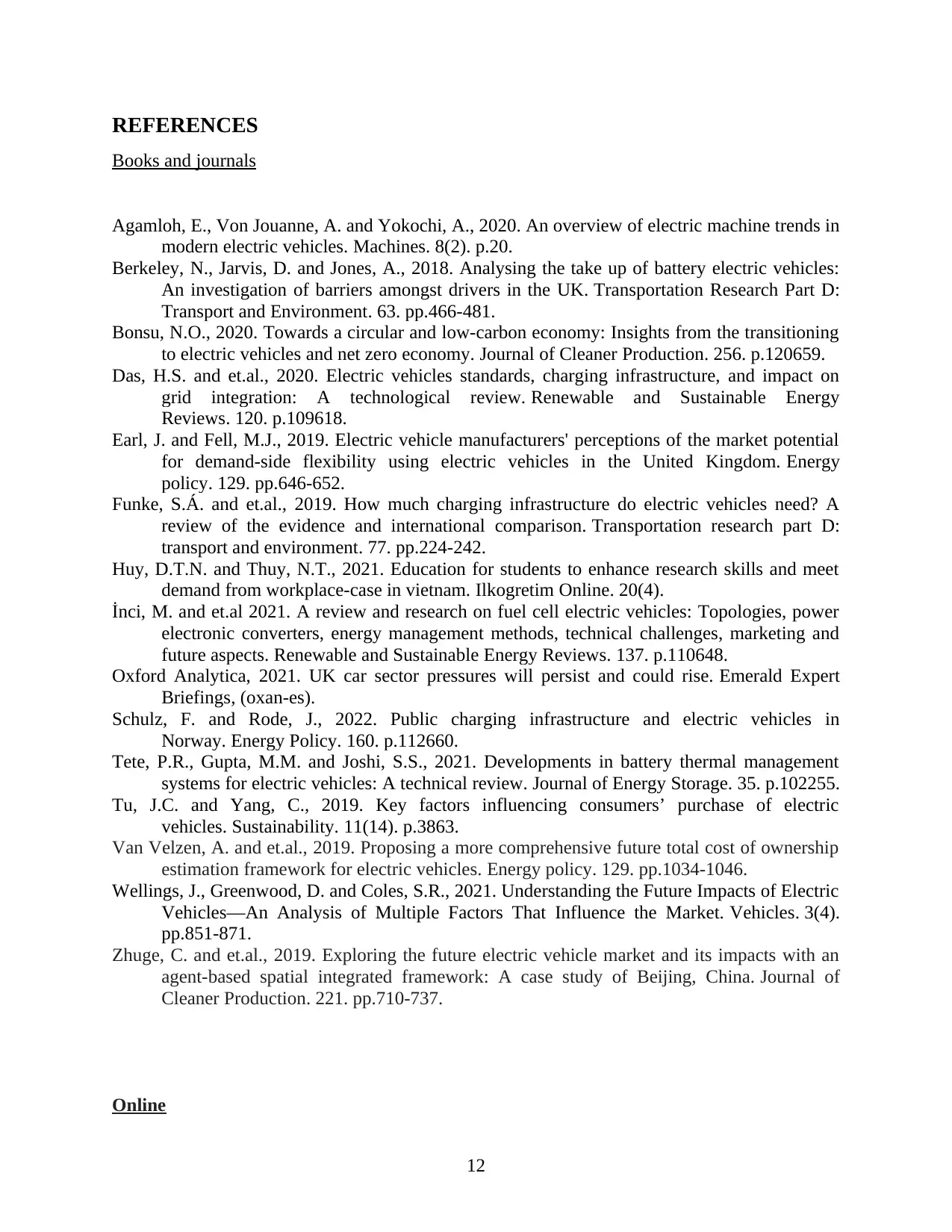
REFERENCES
Books and journals
Agamloh, E., Von Jouanne, A. and Yokochi, A., 2020. An overview of electric machine trends in
modern electric vehicles. Machines. 8(2). p.20.
Berkeley, N., Jarvis, D. and Jones, A., 2018. Analysing the take up of battery electric vehicles:
An investigation of barriers amongst drivers in the UK. Transportation Research Part D:
Transport and Environment. 63. pp.466-481.
Bonsu, N.O., 2020. Towards a circular and low-carbon economy: Insights from the transitioning
to electric vehicles and net zero economy. Journal of Cleaner Production. 256. p.120659.
Das, H.S. and et.al., 2020. Electric vehicles standards, charging infrastructure, and impact on
grid integration: A technological review. Renewable and Sustainable Energy
Reviews. 120. p.109618.
Earl, J. and Fell, M.J., 2019. Electric vehicle manufacturers' perceptions of the market potential
for demand-side flexibility using electric vehicles in the United Kingdom. Energy
policy. 129. pp.646-652.
Funke, S.Á. and et.al., 2019. How much charging infrastructure do electric vehicles need? A
review of the evidence and international comparison. Transportation research part D:
transport and environment. 77. pp.224-242.
Huy, D.T.N. and Thuy, N.T., 2021. Education for students to enhance research skills and meet
demand from workplace-case in vietnam. Ilkogretim Online. 20(4).
İnci, M. and et.al 2021. A review and research on fuel cell electric vehicles: Topologies, power
electronic converters, energy management methods, technical challenges, marketing and
future aspects. Renewable and Sustainable Energy Reviews. 137. p.110648.
Oxford Analytica, 2021. UK car sector pressures will persist and could rise. Emerald Expert
Briefings, (oxan-es).
Schulz, F. and Rode, J., 2022. Public charging infrastructure and electric vehicles in
Norway. Energy Policy. 160. p.112660.
Tete, P.R., Gupta, M.M. and Joshi, S.S., 2021. Developments in battery thermal management
systems for electric vehicles: A technical review. Journal of Energy Storage. 35. p.102255.
Tu, J.C. and Yang, C., 2019. Key factors influencing consumers’ purchase of electric
vehicles. Sustainability. 11(14). p.3863.
Van Velzen, A. and et.al., 2019. Proposing a more comprehensive future total cost of ownership
estimation framework for electric vehicles. Energy policy. 129. pp.1034-1046.
Wellings, J., Greenwood, D. and Coles, S.R., 2021. Understanding the Future Impacts of Electric
Vehicles—An Analysis of Multiple Factors That Influence the Market. Vehicles. 3(4).
pp.851-871.
Zhuge, C. and et.al., 2019. Exploring the future electric vehicle market and its impacts with an
agent-based spatial integrated framework: A case study of Beijing, China. Journal of
Cleaner Production. 221. pp.710-737.
Online
12
Books and journals
Agamloh, E., Von Jouanne, A. and Yokochi, A., 2020. An overview of electric machine trends in
modern electric vehicles. Machines. 8(2). p.20.
Berkeley, N., Jarvis, D. and Jones, A., 2018. Analysing the take up of battery electric vehicles:
An investigation of barriers amongst drivers in the UK. Transportation Research Part D:
Transport and Environment. 63. pp.466-481.
Bonsu, N.O., 2020. Towards a circular and low-carbon economy: Insights from the transitioning
to electric vehicles and net zero economy. Journal of Cleaner Production. 256. p.120659.
Das, H.S. and et.al., 2020. Electric vehicles standards, charging infrastructure, and impact on
grid integration: A technological review. Renewable and Sustainable Energy
Reviews. 120. p.109618.
Earl, J. and Fell, M.J., 2019. Electric vehicle manufacturers' perceptions of the market potential
for demand-side flexibility using electric vehicles in the United Kingdom. Energy
policy. 129. pp.646-652.
Funke, S.Á. and et.al., 2019. How much charging infrastructure do electric vehicles need? A
review of the evidence and international comparison. Transportation research part D:
transport and environment. 77. pp.224-242.
Huy, D.T.N. and Thuy, N.T., 2021. Education for students to enhance research skills and meet
demand from workplace-case in vietnam. Ilkogretim Online. 20(4).
İnci, M. and et.al 2021. A review and research on fuel cell electric vehicles: Topologies, power
electronic converters, energy management methods, technical challenges, marketing and
future aspects. Renewable and Sustainable Energy Reviews. 137. p.110648.
Oxford Analytica, 2021. UK car sector pressures will persist and could rise. Emerald Expert
Briefings, (oxan-es).
Schulz, F. and Rode, J., 2022. Public charging infrastructure and electric vehicles in
Norway. Energy Policy. 160. p.112660.
Tete, P.R., Gupta, M.M. and Joshi, S.S., 2021. Developments in battery thermal management
systems for electric vehicles: A technical review. Journal of Energy Storage. 35. p.102255.
Tu, J.C. and Yang, C., 2019. Key factors influencing consumers’ purchase of electric
vehicles. Sustainability. 11(14). p.3863.
Van Velzen, A. and et.al., 2019. Proposing a more comprehensive future total cost of ownership
estimation framework for electric vehicles. Energy policy. 129. pp.1034-1046.
Wellings, J., Greenwood, D. and Coles, S.R., 2021. Understanding the Future Impacts of Electric
Vehicles—An Analysis of Multiple Factors That Influence the Market. Vehicles. 3(4).
pp.851-871.
Zhuge, C. and et.al., 2019. Exploring the future electric vehicle market and its impacts with an
agent-based spatial integrated framework: A case study of Beijing, China. Journal of
Cleaner Production. 221. pp.710-737.
Online
12
⊘ This is a preview!⊘
Do you want full access?
Subscribe today to unlock all pages.

Trusted by 1+ million students worldwide
1 out of 13
Related Documents
Your All-in-One AI-Powered Toolkit for Academic Success.
+13062052269
info@desklib.com
Available 24*7 on WhatsApp / Email
![[object Object]](/_next/static/media/star-bottom.7253800d.svg)
Unlock your academic potential
Copyright © 2020–2026 A2Z Services. All Rights Reserved. Developed and managed by ZUCOL.



